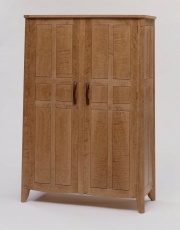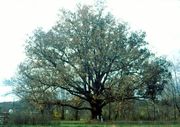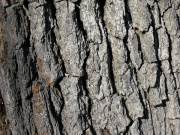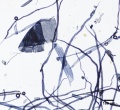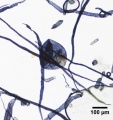Difference between revisions of "White oak"
m (Text replace - "== Authority ==" to "== Sources Checked for Data in Record ==") |
|||
| (One intermediate revision by the same user not shown) | |||
| Line 1: | Line 1: | ||
| − | [[File:1991.450-E3660CR-d1.jpg|thumb| | + | [[File:1991.450-E3660CR-d1.jpg|thumb|White oak wardrobe<br>MFA# 1991.450]] |
== Description == | == Description == | ||
| Line 7: | Line 7: | ||
''Quercus alba''; chêne blanc (Fr.); carvalho branco americano (Port.); stave oak; roble; roblecito; mamecillo; encino; cucharillo | ''Quercus alba''; chêne blanc (Fr.); carvalho branco americano (Port.); stave oak; roble; roblecito; mamecillo; encino; cucharillo | ||
| + | [[File:AncientOakf5.jpg|thumb|White oak ''Quercus alba'']] | ||
| + | [[File:White.Oak2_bark_AA.jpg|thumb|White oak ''Quercus alba'']] | ||
| + | == Physical and Chemical Properties == | ||
| − | + | * Medium tree growing to 30 m with spreading, oval crown | |
| − | + | * Bark=light brown with blocky patches or scales | |
| − | + | * Leaves=oblong (10-16 cm) with 7 to 10 rounded lobes. | |
| − | + | * Fruit=long, oval acorn with warty cap, maturation takes one year | |
| − | |||
| − | Medium tree growing to 30 m with spreading, oval crown Bark=light brown with blocky patches or scales Leaves=oblong (10-16 cm) with 7 to 10 rounded lobes. Fruit=long, oval acorn with warty cap, maturation takes one year | ||
Paper fiber type: hardwood, ring porous. Using transmitted light microscopy, pulp is identified by two sizes of vessels with profuse pitting. The smaller late wood vessels of white oak will stain similarly to the early wood vessels, which can help distinguish pulp from [[red oak]]. Vasocentric trachieds are worm-like and heavily pitted. Perforations are simple. Tyloses may be present. Appearance with [[Graff "C" stain]]: dark blue, but varies with bleaching. Average dimensions of fibers: length 1.47, 14-22μm wide. Common pulping method: [[kraft process|kraft]]. | Paper fiber type: hardwood, ring porous. Using transmitted light microscopy, pulp is identified by two sizes of vessels with profuse pitting. The smaller late wood vessels of white oak will stain similarly to the early wood vessels, which can help distinguish pulp from [[red oak]]. Vasocentric trachieds are worm-like and heavily pitted. Perforations are simple. Tyloses may be present. Appearance with [[Graff "C" stain]]: dark blue, but varies with bleaching. Average dimensions of fibers: length 1.47, 14-22μm wide. Common pulping method: [[kraft process|kraft]]. | ||
| Line 20: | Line 21: | ||
<gallery> | <gallery> | ||
| + | File:Quart.Am.white_oak.jpg|thumb|Quartered American White Oak (''Quercus alba'') | ||
File:42_Appal.WhiteOak.jpg|Appalachian White Oak (''Quercus alba'') | File:42_Appal.WhiteOak.jpg|Appalachian White Oak (''Quercus alba'') | ||
File:43_SouthernWhiteOak.jpg|Southern White Oak (''Quercus alba'') | File:43_SouthernWhiteOak.jpg|Southern White Oak (''Quercus alba'') | ||
| − | |||
| − | |||
File:Whiteoak 10x.jpg|White oak paper pulp stained with Graff "C" Stain | File:Whiteoak 10x.jpg|White oak paper pulp stained with Graff "C" Stain | ||
File:Whiteoak tyloses 10x.jpg|White oak paper pulp stained with Graff "C" Stain | File:Whiteoak tyloses 10x.jpg|White oak paper pulp stained with Graff "C" Stain | ||
</gallery> | </gallery> | ||
| − | == | + | ==Resources and Citations== |
| + | |||
| + | * Wood Database: [https://www.wood-database.com/white-oak/ White oak] | ||
* G.S.Brady, ''Materials Handbook'', McGraw-Hill Book Co., New York, 1971 Comment: p. 555 | * G.S.Brady, ''Materials Handbook'', McGraw-Hill Book Co., New York, 1971 Comment: p. 555 | ||
| Line 34: | Line 36: | ||
* ''Dictionary of Building Preservation'', Ward Bucher, ed., John Wiley & Sons, Inc., New York City, 1996 | * ''Dictionary of Building Preservation'', Ward Bucher, ed., John Wiley & Sons, Inc., New York City, 1996 | ||
| − | * | + | * Virginia Tech Dendrology website at www.fw.vt.edu/dendro/dendrology/main.htm (accessed Oct. 8, 2005) |
| − | * Wikipedia | + | * Wikipedia: http://en.wikipedia.org/wiki/White_oak (Accessed Oct. 8, 2005) |
* Marja-Sisko Ilvessalo-Pfäffli. ''Fiber Atlas: Identification of Papermaking Fibers'' (Springer Series in Wood Science). Springer, 1995. | * Marja-Sisko Ilvessalo-Pfäffli. ''Fiber Atlas: Identification of Papermaking Fibers'' (Springer Series in Wood Science). Springer, 1995. | ||
Latest revision as of 08:52, 27 June 2022
Description
A large oak, Quercus alba, native to eastern North America. White oak has a light brown, coarse-grain wood that is strong. The high quality wood is used for lumber, millwork, and flooring.
Synonyms and Related Terms
Quercus alba; chêne blanc (Fr.); carvalho branco americano (Port.); stave oak; roble; roblecito; mamecillo; encino; cucharillo
Physical and Chemical Properties
- Medium tree growing to 30 m with spreading, oval crown
- Bark=light brown with blocky patches or scales
- Leaves=oblong (10-16 cm) with 7 to 10 rounded lobes.
- Fruit=long, oval acorn with warty cap, maturation takes one year
Paper fiber type: hardwood, ring porous. Using transmitted light microscopy, pulp is identified by two sizes of vessels with profuse pitting. The smaller late wood vessels of white oak will stain similarly to the early wood vessels, which can help distinguish pulp from Red oak. Vasocentric trachieds are worm-like and heavily pitted. Perforations are simple. Tyloses may be present. Appearance with Graff "C" stain: dark blue, but varies with bleaching. Average dimensions of fibers: length 1.47, 14-22μm wide. Common pulping method: kraft.
Additional Images
Resources and Citations
- Wood Database: White oak
- G.S.Brady, Materials Handbook, McGraw-Hill Book Co., New York, 1971 Comment: p. 555
- Dictionary of Building Preservation, Ward Bucher, ed., John Wiley & Sons, Inc., New York City, 1996
- Virginia Tech Dendrology website at www.fw.vt.edu/dendro/dendrology/main.htm (accessed Oct. 8, 2005)
- Wikipedia: http://en.wikipedia.org/wiki/White_oak (Accessed Oct. 8, 2005)
- Marja-Sisko Ilvessalo-Pfäffli. Fiber Atlas: Identification of Papermaking Fibers (Springer Series in Wood Science). Springer, 1995.
- Walter Rantanen. "Fiber ID Course." Integrated Paper Services. June 2013. Lecture.
